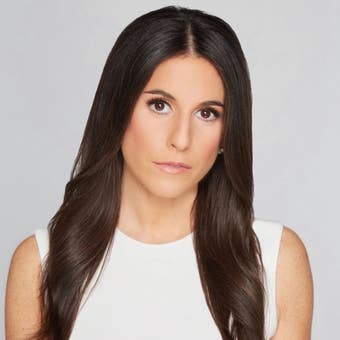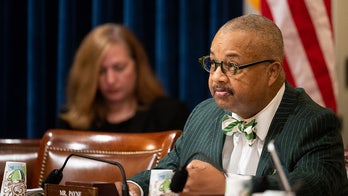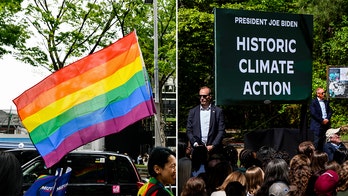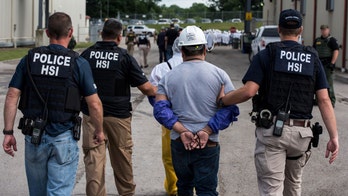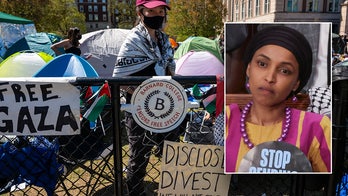What We Have Learned From the Durham Investigation
Paul Gigot interviews Wall Street Journal columnist Kim Strassel
WASHINGTON, D.C. – Special Counsel John Durham’s team in its opening argument Tuesday alleged that former Clinton campaign lawyer Michael Sussmann used the FBI as "a political tool" to "manipulate" the bureau on "the eve" of the 2016 presidential election to create an "October surprise" against then-candidate Donald Trump — a plan that "largely succeeded."
Sussmann is charged with making a false statement to the FBI when he told former FBI General Counsel James Baker in September 2016 — less than two months before the presidential election — that he was not doing work "for any client" when he requested and attended a meeting with Baker where he presented "purported data and ‘white papers’ that allegedly demonstrated a covert communicates channel" between the Trump Organization and Alfa Bank, which has ties to the Kremlin.
SUSSMANN-DURHAM TRIAL: WHAT YOU NEED TO KNOW AHEAD OF OPENING ARGUMENTS, FIRST DAY OF TESTIMONY
Durham’s team alleges Sussmann was, in fact, doing work for two clients: the Hillary Clinton campaign and a technology executive, Rodney Joffe. Following the meeting with Baker, Sussmann billed the Hillary Clinton campaign for his work.
Sussmann has pleaded not guilty to the charge.
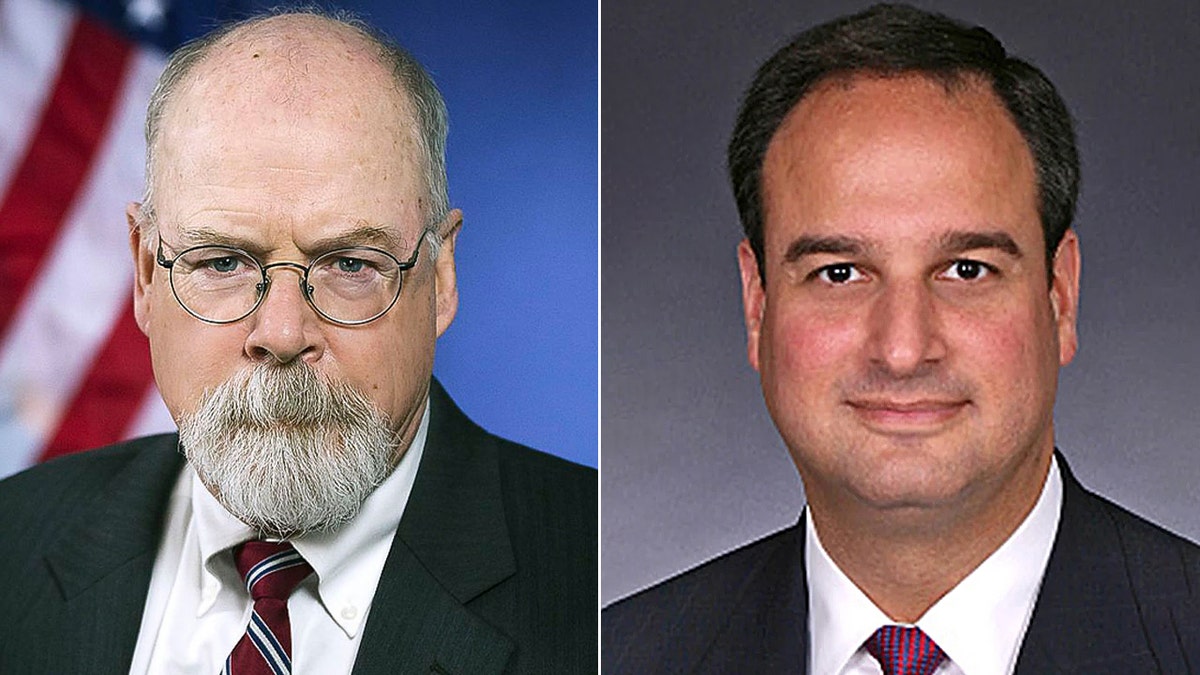
Photo of John Durham and Michael Sussmann. Sussman pic: Perkins Coie (Perkins Coie)
Federal prosecutor Deborah Brittain Shaw delivered the government’s opening argument, saying the case is one "about privilege."
"Privilege of a lawyer who thought he could lie to the FBI without consequences; privilege of a lawyer who thought that for the powerful, normal rules didn’t apply," Shaw argued on behalf of the government.
The government argued that in bringing the "serious allegations" to the FBI, Sussmann "bypassed normal channels and went straight to the FBI’s top lawyer," then-General Counsel James Baker.
"He then sat across from that lawyer and lied to him," Shaw said, noting the lie was "designed to achieve political" ends, and "designed to inject the FBI into the election."
The government, in delivering the argument, wanted to "address the proverbial elephant in the room."
"Some people have very strong feelings about politics, and about Russia, and many people have strong feelings about Donald Trump and Hillary Clinton," Shaw said. "We are not here because allegations involve either."
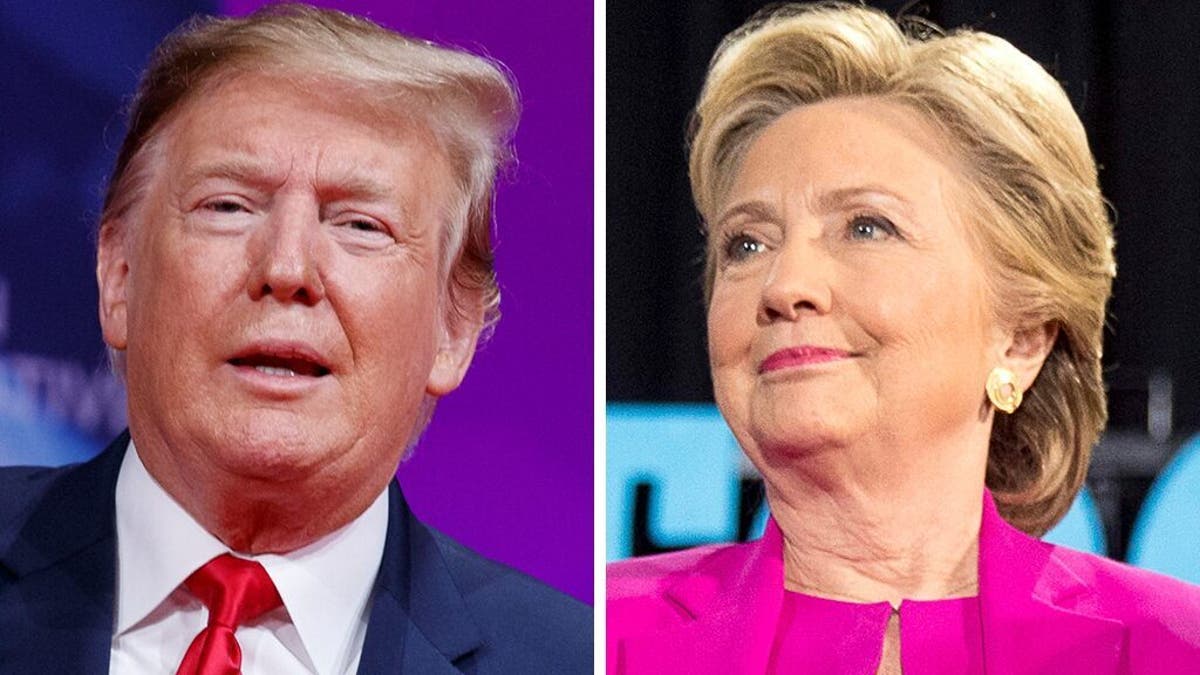
Former President Donald Trump and former Secretary of State Hillary Clinton.
"We are here because the FBI is our institution that should don’t be used as a political tool for anyone — not Republicans, not Democrats, not anyone," Shaw said, urging jurors to leave their own "political views" out of the decisions they make in the courtroom.
The government said the evidence presented throughout the trial will show that "the lie" was part of a "bigger plan," one to "create an October surprise on the eve of the presidential election."
"A plan that used and manipulated the FBI. A plan that the defendant hoped would trigger news outlets and trigger an FBI investigation," Shaw said. "A plan that largely succeeded."
The government plans to discuss details of Sussmann’s meetings with the opposition research firm the Clinton campaign hired to dig up dirt on the Trump campaign — Fusion GPS.
The now-infamous anti-Trump dossier, which contained allegations of purported coordination between Trump and the Russian government, was authored by Christopher Steele, an ex-British intelligence officer, and commissioned by Fusion GPS.
Perkins Coie, where Sussmann had been employed, is the law firm through which the Democratic National Committee (DNC) and the Clinton campaign funded the dossier.
"Opposition research is something that happens in politics and has for years — Republicans do it, Democrats do it," the government argued, noting that "opposition research is not illegal," but lying to the FBI is.
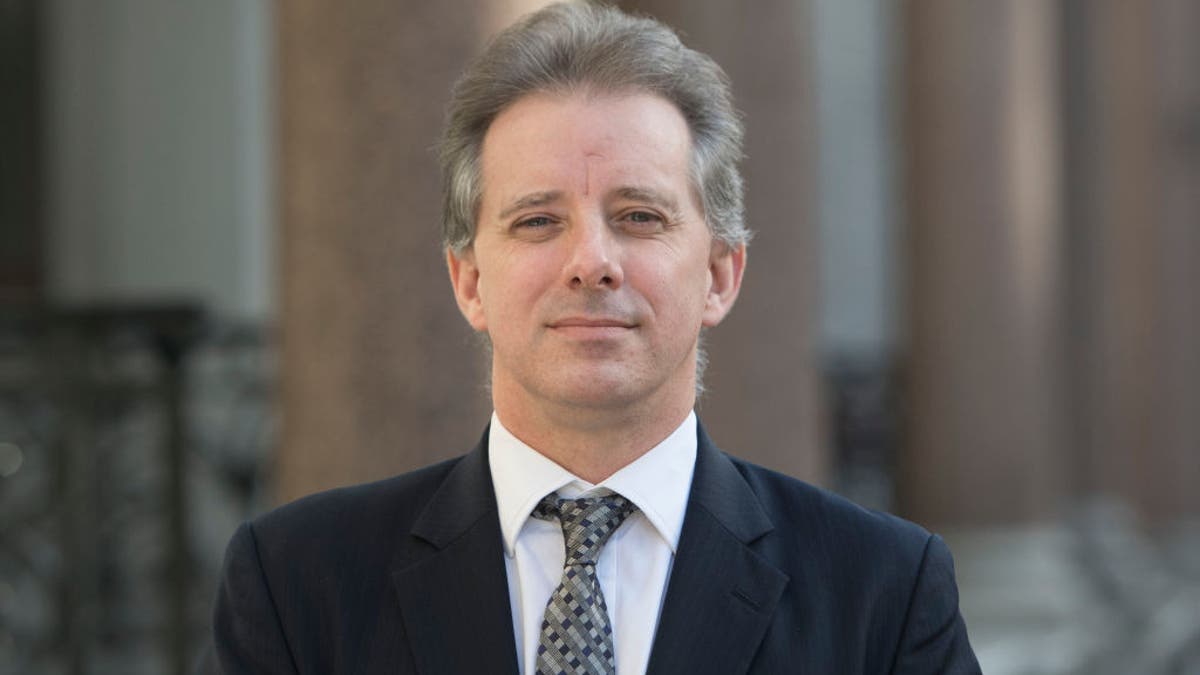
Christopher Steele, the former MI6 agent who set up Orbis Business Intelligence and compiled a dossier on Donald Trump. ((Photo by Victoria Jones/PA Images via Getty Images))
The government told the jury that during the trial, it will present physical evidence, including handwritten notes from FBI officials, two thumb drives that Sussmann gave to the FBI containing the allegations against Trump and also testimony and documents to prove their charge against Sussmann.
"This is a case about privilege," the government reiterated. "No one should be so privileged as to have the ability to walk into the FBI and lie for political ends."
"Whether we are Democrats or Republicans, whether we hate Donald Trump or love him, we have to believe some things are above politics," the government said, adding that the FBI "should never be used as a political pawn."
Moments later, Sussmann’s defense began to present its opening argument, which was delivered by Michael Bosworth.
Bosworth argued that Sussmann, a well-known and high-profile national security lawyer "didn’t lie to the FBI" and "wouldn’t lie to the FBI" based on his years of experience, his relationships with national security officials within the government, and his character.
DURHAM RELEASES FORMER CLINTON LAWYER MICHAEL SUSSMANN'S TEXT MESSAGE, SAYS HE PUT 'LIE IN WRITING'
Bosworth urged the jury to consider four questions when evaluating evidence and testimony throughout the trial: "What did Sussmann actually say to the FBI? Is what he said false? Did he intend to say something false? Did it matter?"
"The government has to prove all of these beyond a reasonable doubt," Bosworth said. "They're going to stumble at every turn."
Bosworth called the charge against his client "nonsensical," calling Sussmann "a good man, a family man," and an "honest man."
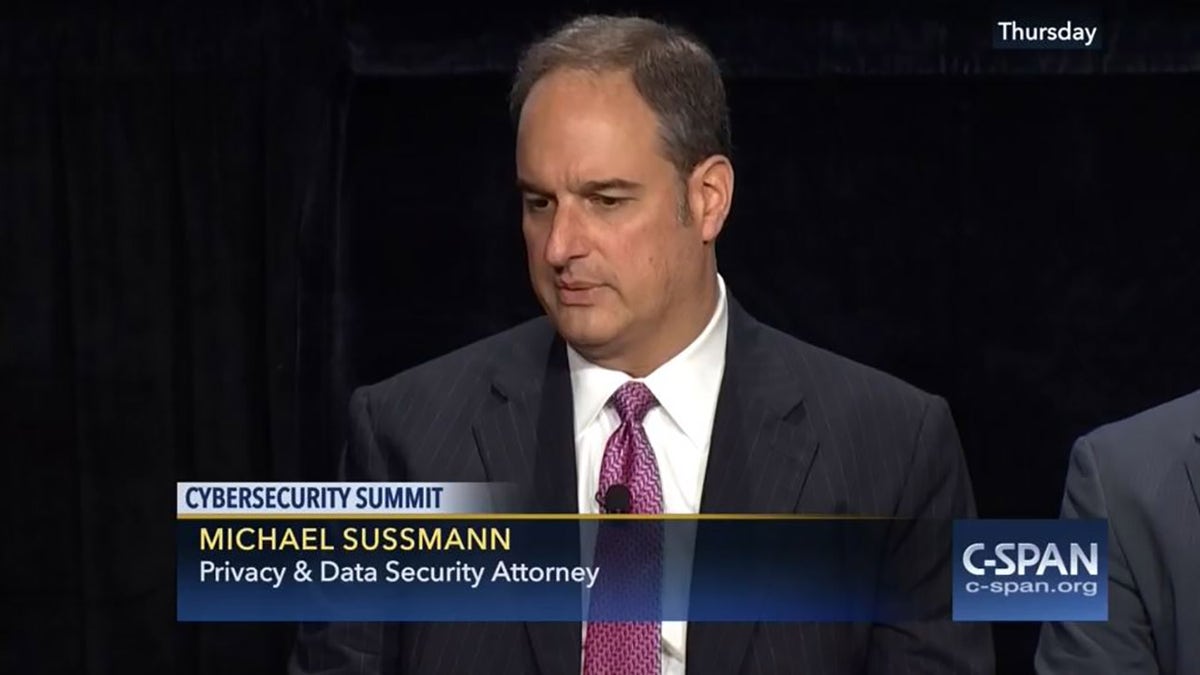
Michael Sussman attends the Washington Post’s sixth annual cybersecurity summit on October 6, 2016
Bosworth also stressed that, at the time of the meeting with Baker in September 2016, it was well known that Sussmann had represented the DNC, after the party’s servers were hacked by Russians, and that he was representing the Clinton campaign.
Bosworth argued that Sussmann would have no reason to conceal his work for the Clinton campaign.
During the opening argument, it became clear that the defense will likely hit Baker’s credibility, invoking his past testimony, flip-flopping on whether Sussmann mentioned he was working on behalf of clients, or on his own as a concerned citizen, when he presented the Trump-Alfa Bank allegations.
Bosworth also argued that Baker did not memorialize the September 2016 conversation with Sussmann in any way, and stressed that the meeting took place just between Baker and Sussmann.
With regard to the data, Bosworth said Sussmann brought the information first to the New York Times, but when it appeared the story would be imminently published, Sussmann took initiative to reach out to the FBI so that the bureau would not be caught "by surprise."
"Sussmann said there might be smoke, they look, and said, no fire," Bosworth said of the FBI’s investigation into the data allegedly showing a connection between Trump and the Kremlin-tied bank. "Which is what they do with tips they get day, after day, after day. That’s what the FBI does."
Bosworth argued that Sussmann "did not go to the FBI to do the Clinton campaign’s bidding," saying the meeting would have been "the opposite of what they wanted."
"Use your common sense: if the Clinton campaign really wanted to send in an attorney to conceal his relationship with the campaign, he is the last person they would send in," Bosworth said. "The FBI knew he represented partisan clients."
He added: "They knew from the beginning, no matter what Sussmann said, there could be politics afoot… they knew he was a lawyer for the DNC and for the Clinton campaign."
The defense also plans to introduce evidence of handwritten notes prepared by Baker ahead of a meeting to brief senior officials at the Trump Justice Department on the Alfa Bank allegations.
The Baker notes, which Bosworth briefly showed to the jury, appeared to state that Sussmann did come to the FBI with the allegations "as an attorney on behalf of his client."
On the prosecution side, Durham’s team is set to introduce a text message Sussmann sent to Baker requesting the September 2016 meeting.
"Jim — it’s Michael Sussmann. I have something time-sensitive (and sensitive) I need to discuss," the text message stated, according to Durham. "Do you have availability for a short meeting tomorrow? I’m coming on my own — not on behalf of a client or company — want to help the Bureau. Thanks."
Baker replied: "OK. I will find a time. What might work for you?"
Durham, in a filing in the weeks leading up to the trial, said "the night before the defendant met with the general counsel, the defendant conveyed the same lie in writing and sent the following text message to the general counsel’s personal cellphone."
The government, during opening arguments Tuesday, referenced that same text message.
After opening arguments, the government is set to bring two FBI special agents as witnesses, as well as former Clinton campaign lawyer Marc Elias, who worked with Sussmann at Perkins Coie. Elias has testified before the grand jury as part of the government’s case.
Meanwhile, Durham in February first revealed that the government would attempt to establish at trial that among the data "exploited" was domain name system (DNS) internet traffic relating to "a particular healthcare provider, Trump Tower, Donald Trump's Central Park West apartment building and the Executive Office of the President of the United States (EOP)."
In February, Durham said data was exploited "by mining the EOP's DNS traffic and other data for the purpose of gathering derogatory information about Donald Trump," adding that the data was used to establish "an inference" and "narrative" tying Trump to Russia.
Durham also alleges that Sussmann in February 2017 provided an "updated set of allegations," including the Alfa Bank claims, and additional allegations related to Trump, to a second U.S. government agency, which Fox News has confirmed was the CIA.
In defense of Sussmann’s meeting with the CIA, defense attorney Bosworth, on Tuesday, argued that he was"motivated by an actual interest in national security."
"If he wasn’t motivated by an actual interest in national security, why did he go to the CIA, months after the election?" Bosworth asked the jury. "He had a genuine interest in national security and doing the right thing."
Tuesday is the first full day of the first trial stemming from Durham’s years-long investigation into the origins of the Trump-Russia probe.
Durham was present in the courtroom for jury selection Monday, and again for opening arguments Tuesday. U.S. District Judge Christopher Cooper welcomed Durham to the courtroom.
Durham was tapped in 2019 by Attorney General Bill Barr to investigate the origins of the FBI’s original investigation into the Trump campaign, which led to the appointment of Robert Mueller as special counsel.
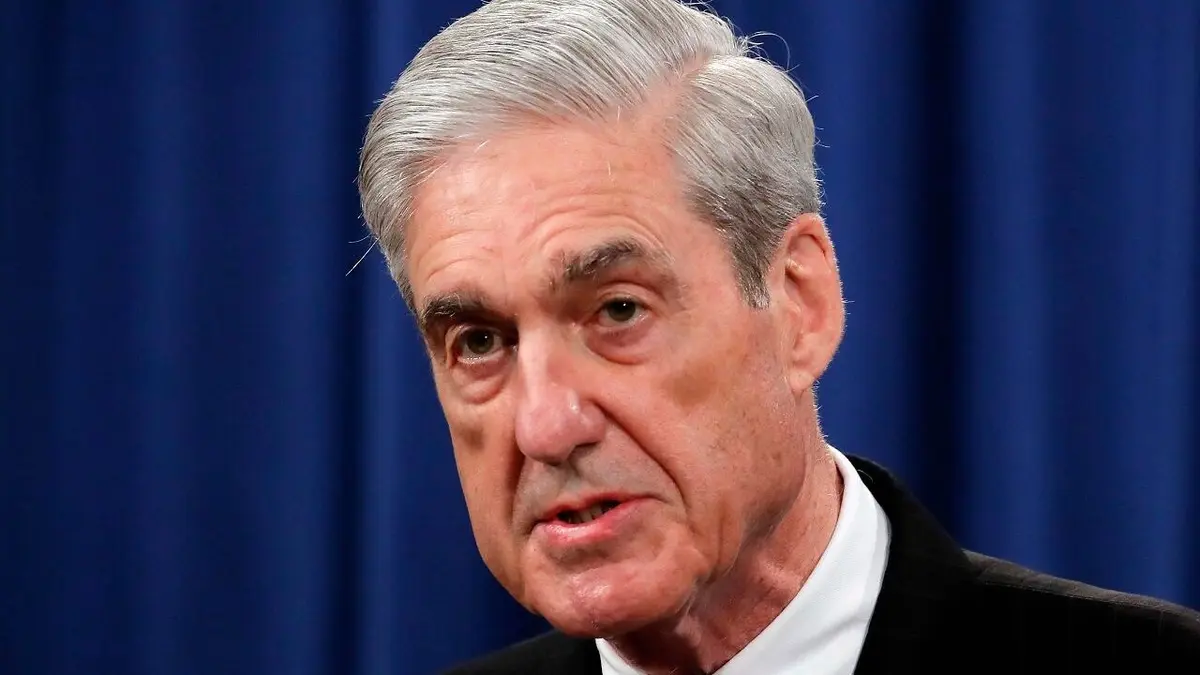
FILE - In this May 29, 2019, file photo, Special counsel Robert Mueller speaks at the Department of Justice in Washington, about the Russia investigation. (AP Photo/Carolyn Kaster, File) (AP Photo/Carolyn Kaster, File)
At the time, Durham was serving as U.S. attorney for Connecticut.
Mueller's investigation yielded no evidence of criminal conspiracy or coordination between the Trump campaign and Russian officials during the 2016 presidential election.
In October 2020, Barr appointed Durham as special counsel to ensure that he would be able to continue his investigative work — regardless of the outcome of the 2020 presidential election.
CLICK HERE TO GET THE FOX NEWS APP
Durham has indicted three people as part of his investigation: Sussmann in September 2021, Igor Danchenko in November 2021 and Kevin Clinesmith in August 2020.
Meanwhile, Cooper, who is presiding over the trial, was appointed by former President Barack Obama in 2014 and received unanimous confirmation by the U.S. Senate.
Early in his career, Cooper served in the Justice Department, and later joined private practice. Cooper worked in private practice for nearly two decades, and specialized in defending clients in white-collar criminal matters.
